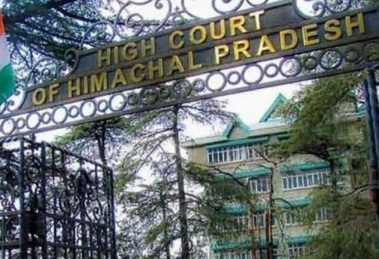Himachal Pradesh High Court Blasts Petitioner Over Allegations of Torture in Observation Home; Clears Accused Staff of Wrongdoing. The Division bench of the High Court headed by Justices Tarlok Singh Chauhan and Satyen Vaidya Imposed Fine of Rs 50,000 on the petitioner and warned the latter to act with due diligence.
Shimla, December 23: The Himachal Pradesh High Court pulled up activist Ajay Srivastava, founder of Umang Foundation, for making unverified and baseless allegations of torture and human rights violations at the Hira Nagar observation home in Shimla.
Justice Tarlok Singh Chauhan reprimanded Srivastava for his reckless claims, slapping him with a fine of ₹50,,000 for wasting the court’s time and tarnishing reputations without evidence.
A dramatic turn of events unfolded in the Himachal Pradesh High Court as a Public Interest Litigation (PIL) alleging human rights violations at an observation home in Hira Nagar, Shimla, took an unexpected twist.
Filed by Ajai Srivastava, a self-proclaimed human rights activist and founder of the Umang Foundation, the case initially shook the state, but investigations eventually found the claims baseless.
The PIL, based on a letter addressed to the Chief Justice by Srivastava, painted a grim picture of the observation home, claiming rampant torture, beatings, and even instances of attempted suicide among the children lodged there.
The letter cited specific incidents, including one where a child’s dislocated shoulder was allegedly ignored and another where a blood-stained shirt was reportedly burned to destroy evidence.
Srivastava’s allegations didn’t stop there. He accused the observation home superintendent and staff of physical abuse, neglecting education requests, and serving poor-quality food.
He claimed the environment was more suited to breeding hardened criminals than reforming young offenders.
The High Court took cognizance of the matter and issued notices, sparking swift action from authorities.
As a result, the superintendent’s services were terminated, and his reputation dragged through the mud. However, the subsequent investigation painted a starkly different picture.
After detailed inquiries, the allegations were found to be baseless. The court observed that Srivastava, while raising concerns, had failed to follow due diligence.
He neither visited the observation home as per Juvenile Justice Model Rules nor verified his claims.
In his affidavit, Srivastava admitted relying on second-hand information from a former inmate and his father, alongside complaints reportedly filed with the Juvenile Justice Board, Solan.
On November 11, the High Court directed Srivastava to file an affidavit detailing the basis of his allegations. Justice Tarlok Singh Chauhan, Acting Chief Justice, highlighted the critical role of accuracy in such sensitive matters, stating,
"Being a public-spirited individual doesn’t absolve one of the responsibility to verify facts."
The court's findings also revealed that the FIR registered against the superintendent was influenced by the petitioner’s claims.
Despite the petitioner’s intentions, the court noted that the damage to the accused’s career and reputation had already been done.
The High Court ultimately ruled that no substantial evidence supported the allegations, and the staff members were exonerated.
“A public-spirited individual is not entitled to make allegations based on hearsay. When a person enters the courtroom with a PIL, they must come with clean hands and verified facts".
"The petitioner has acted recklessly, tarnishing the reputation of the superintendent and staff without any substantial basis,” justice Chauhan ruled.
Despite Srivastava’s admission that his claims were based on second-hand information, Justice Chauhan pointed out that as a social activist, he was expected to adhere to due diligence and follow the protocols laid down in the Juvenile Justice Model Rules.
His failure to verify the allegations before filing the PIL not only wasted judicial resources but also caused irreparable damage to the superintendent’s career and reputation.
The court’s decision sends a strong message about the importance of accountability, even in activism, and serves as a reminder that public-spirited actions must be backed by facts—not hearsay.




